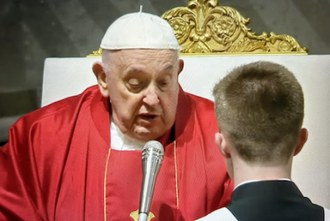Pope presides over Good Friday liturgy in St Peter's Basilica

ICN Screenshot
Source: Vatican News
Pope Francis presided over the liturgy of the Passion and Death of Our Lord Jesus Christ in St Peter's Basilica on Good Friday afternoon. Good Friday is the only day of the year on which Holy Mass is not celebrated. The Church celebrates the Solemn Liturgy of the Passion of the Lord, consisting of three parts: the Liturgy of the Word, culminating in the chanting of the Passion according to St John; the Adoration of the Cross; and reception of Holy Communion.
After the proclamation of the Passion, Cardinal Raniero Cantalamessa, the Preacher of the Pontifical Household, delivered the homily, taking as his starting point the passage: "When you lift up the Son of Man, then you will realize that I Am" (Jn 8:28). This, Cardinal Cantalamessa said, is what Jesus said at the end of a heated dispute with His opponents, observing a sort of "crescendo" compared to the previous 'I Am' pronounced by the Lord in St John's Gospel.
"He no longer says, 'I Am' this or that: the bread of life, the light of the world, the resurrection and the life, and so on. He simply says 'I Am' without further specification," Cardinal Cantalamessa said, noting that this gives His declaration an "absolute, metaphysical dimension."
He said it also intentionally recalls when God Himself proclaims His divine 'I Am' in Exodus 3:14 and Isaiah 43:10-12.
The shocking originality of Jesus making this affirmation, the Cardinal explained, "is discovered only if we pay attention to what precedes Christ's self-affirmation: 'When you lift up the Son of Man,' it is then that you will know that I Am." As if to say: What I am-and, therefore, what God is!-will only be manifested on the Cross."
He underscored the significance of the expression "to be lifted up," in St John's Gospel, referring to the event of the Lord on the Cross.
"We are faced with a total reversal of the human idea of God and, in part, also of that of the Old Testament. Jesus did not come to improve and perfect the idea that people have of God, but, in a certain sense," he explained, "to overturn it and reveal the true face of God." St Paul, he acknowledged, was the first to understand this.
Understood in this light, he observed, "the word of Christ takes on a universal significance that challenges those who read it, in every era and situation, including our own."
In our unconscious mind, the Cardinal reflected, we continue to carry on this very idea of God that Jesus came to change.
"God is all-powerful, no doubt, but what kind of power is it?" he asked. "Faced with human creatures, God finds himself devoid of any capacity, not only coercive, but also defensive. He cannot intervene with authority to impose himself on them. He cannot but respect, to an infinite degree, the free choice of human beings."
"And so, the Father reveals the true face of His omnipotence in His Son."
"It takes little power to show off; it takes a lot of power to put oneself aside and to conceal oneself," he said. "God is this unlimited power of self-concealment! Exinanivit semetipsum: He emptied Himself."
To our "will to power," God has opposed His voluntary powerlessness," he said. "What a lesson for us who, more or less consciously, always want to show off. What a lesson for the powerful of the earth!"
The Cardinal acknowledged that one may think the triumph of Christ in His resurrection, overturns this vision, restoring the invincible omnipotence of God, which the Cardinal said, is true, "but in a very different sense than what we usually think."
"It is very different from the 'triumphs' that were celebrated upon the emperor's return from victorious campaigns, along a street that is still called 'Via Trionfale' in Rome today," he said.
Rather, he recalled, the Resurrection occurs in mystery, without witnesses.
The Lord's death was seen by a large crowd and involved the highest religious and political authorities, but once He had resurrected, Jesus appeared only to a few disciples, out of the spotlight. "In this way, He wanted to tell us that after having suffered, we should not expect an external, visible triumph, such as earthly glory."
"The triumph is given in the invisible, and is of an infinitely superior order, because it is eternal!" he said. "The martyrs of yesterday and today are examples of it."
The Risen One manifests Himself, through His apparitions, "which suffice to provide for a very solid foundation for faith for those who do not from the start refuse to believe."
"But," he clarified, "it is not an act of revenge to humiliate his opponents. He does not appear in their midst to prove them wrong or to mock their impotent anger."
"Any such revenge would be incompatible with the love that Christ wanted to bear witness to in His Passion."
As in His "annihilation" on Calvary, the Cardinal noted that the Lord behaved humbly in the glory of the Resurrection.
The concern of the Risen Jesus, he reiterated, is not to confuse his enemies, but to go and reassure His dismayed disciples, and, before them, the women who had never stopped believing in Him.
The Cardinal went on to emphasize the Lord's reassuring words to the faithful. "Let us accept the invitation that Jesus addresses to the world from His Cross: 'Come to me, all you who labour and are burdened, and I will give you rest'."
He acknowledged that this exhortation would almost be thought of "as irony and a mockery... One who Himself does not have a stone on which to lay His head, one who has been rejected by His people, condemned to death, one 'before whom one covers one's face so as not to see,'" he observed, "dares to address all humanity, of all places and all times, and say: 'Come to me, all of you, and I will give you rest!'"
Regardless, he insisted, the Lord meaningfully offers this consolation for everyone. "Come to me, you who are old, sick, and alone, you whom the world lets die in poverty, hunger, or while under bombardment; you who languish in prison cells because of your faith in me, or your battle for freedom, come to me, you woman victim of the violence," the Lord says, the preacher reassured.
Cardinal Cantalamessa concluded his sermon by saying the Lord's invitation excludes no one, as evidenced by His reassurance: "'Come to me, and I will give you rest! Didn't I promise you: 'When I am lifted up from the earth, I will draw everyone to myself.'"
Cardinal Cantalamessa concluded by marvelling at the incredible consolation and rest the Lord offers us.
"Ask those who have experienced it!" he said.
Watch the service on Vatican Youtube channel: www.youtube.com/watch?v=9VeWcX6a7g8


















